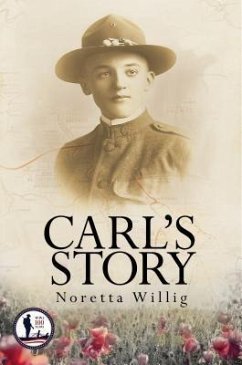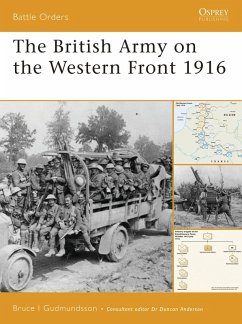
Lost Endeavour (eBook, ePUB)
A survivor's account of the ill-fated Gallipoli Campaign
Redaktion: Crane, Michael; de Broglio, Bernard

PAYBACK Punkte
5 °P sammeln!
Charles Watkins sailed for the Dardanelles with the 1/6th Battalion Lancashire Fusiliers in 1915. War, he said, was a welcome escape from hard labour in a Lancashire cotton mill. Fifty years later, he wrote his memoir, a 'hotch-potch of Gallipoli memories.'"In perpetrating this literary outrage, some apology is due. I could give many plausible excuses for recording moments of this disastrous campaign, but the real truth is the selfish pleasure I find in recalling one crowded hour of glorious life. It was my very good fortune to serve with a Lancashire Territorial Division. To the memory of tho...
Charles Watkins sailed for the Dardanelles with the 1/6th Battalion Lancashire Fusiliers in 1915. War, he said, was a welcome escape from hard labour in a Lancashire cotton mill. Fifty years later, he wrote his memoir, a 'hotch-potch of Gallipoli memories.'
"In perpetrating this literary outrage, some apology is due. I could give many plausible excuses for recording moments of this disastrous campaign, but the real truth is the selfish pleasure I find in recalling one crowded hour of glorious life. It was my very good fortune to serve with a Lancashire Territorial Division. To the memory of those contumacious, argumentative, sentimental and lovable Lancashire lads - 'Salud.' No better comrades ever trod the field of battle..."
"Students of military strategy and tactics had best throw this book away for they'll learn nothing from it. In fact, I know even less of strategy and tactics than did the High-Ups who conducted the campaign. What's more, a lowly private soldier sees very little of the larger picture of war - his own grubby little nose is always buried too deeply in his own particular patch of the dung-heap..."
The campaign is not short of operational histories, but few accounts get into the mind of the private soldier so successfully.
"The trouble," says Watkins, "is that most old soldiers develop a reluctance to talk - except perhaps after a few drinks, and when we seem, then, to get a little boastful and silly. At best, and when we are stone-sober, we feel we are merely a little boring to a new and unsympathetic generation.
"So we clam-up. We leave it to the cold, clinical dissection of historians to record the battles, the victories... and the defeats. The live and vivid experiences of the soldiers themselves are seldom, if ever, recorded - which is a pity, for without these how can the atmosphere of the times themselves ever be made to come to life."
Lost Endeavour was published for 'limited and private circulation' in 1970, then again in 1982.
For this modern edition, the editors have added a short biography of Watkins as an appendix, alongside several articles he wrote for the Gallipoli Association's journal, 'The Gallipolian'. For background and context, the editors include their notes on individuals, places and events mentioned by Watkins in the text.
The reader will also find detail on the 6th Lancs Fusiliers at Helles - the battalion's establishment, drafts and battle casualties, a timeline for May to December 1915, eight maps, and a Gallipoli roll of honour.
"In perpetrating this literary outrage, some apology is due. I could give many plausible excuses for recording moments of this disastrous campaign, but the real truth is the selfish pleasure I find in recalling one crowded hour of glorious life. It was my very good fortune to serve with a Lancashire Territorial Division. To the memory of those contumacious, argumentative, sentimental and lovable Lancashire lads - 'Salud.' No better comrades ever trod the field of battle..."
"Students of military strategy and tactics had best throw this book away for they'll learn nothing from it. In fact, I know even less of strategy and tactics than did the High-Ups who conducted the campaign. What's more, a lowly private soldier sees very little of the larger picture of war - his own grubby little nose is always buried too deeply in his own particular patch of the dung-heap..."
The campaign is not short of operational histories, but few accounts get into the mind of the private soldier so successfully.
"The trouble," says Watkins, "is that most old soldiers develop a reluctance to talk - except perhaps after a few drinks, and when we seem, then, to get a little boastful and silly. At best, and when we are stone-sober, we feel we are merely a little boring to a new and unsympathetic generation.
"So we clam-up. We leave it to the cold, clinical dissection of historians to record the battles, the victories... and the defeats. The live and vivid experiences of the soldiers themselves are seldom, if ever, recorded - which is a pity, for without these how can the atmosphere of the times themselves ever be made to come to life."
Lost Endeavour was published for 'limited and private circulation' in 1970, then again in 1982.
For this modern edition, the editors have added a short biography of Watkins as an appendix, alongside several articles he wrote for the Gallipoli Association's journal, 'The Gallipolian'. For background and context, the editors include their notes on individuals, places and events mentioned by Watkins in the text.
The reader will also find detail on the 6th Lancs Fusiliers at Helles - the battalion's establishment, drafts and battle casualties, a timeline for May to December 1915, eight maps, and a Gallipoli roll of honour.
Dieser Download kann aus rechtlichen Gründen nur mit Rechnungsadresse in A, D ausgeliefert werden.













